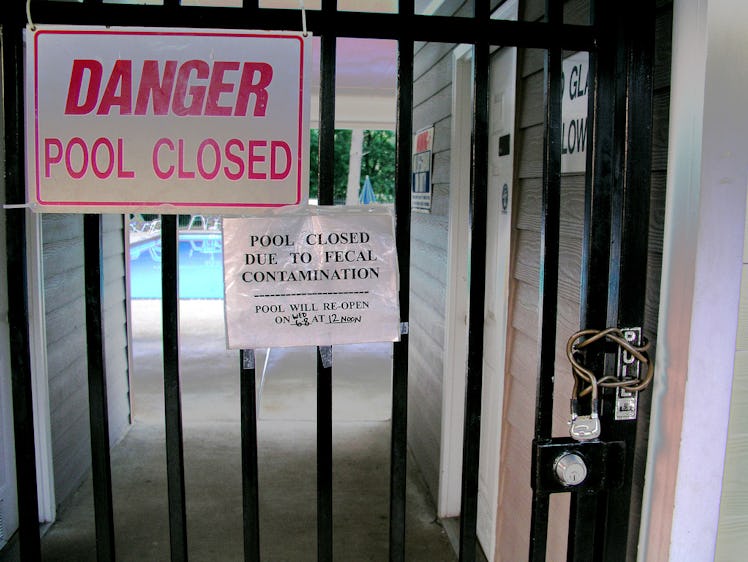‘Crypto’ Outbreaks Linked to Swimming Pools on the Rise
The CDC offers helpful advice: Don't poop in pools.

Cryptosporidium, a parasite that spreads via feces, may be on the rise in U.S. swimming pools and waterparks, according to an immensely unappealing new report from the Centers for Disease Control and Prevention. One of the most common illnesses linked to swimming pools, ‘Crypto’ can cause up to six weeks of diarrhea, stomach cramps, and nausea in otherwise healthy swimmers. The CDC says 32 outbreaks were reported in 2016, triple the figure from 2004.
To help prevent infection, the CDC offers pretty straightforward advice: Don’t poop in the pool and don’t drink poopy pool water. “Do not swim or let your kids swim if sick with diarrhea,” Michele Hlavsa, chief of CDC’s Healthy Swimming Program, said in a statement. “Protect yourself from getting sick by not swallowing the water in which you swim.”
Cryptosporidium parasites are survivors. The microscopic diarrhoeals begin their lives as hardy oocysts hiding in infected feces then, once swallowed by a suitable host, hijack cells in order to produce more oocysts. That’s when the diarrhea starts and, with every watery excretion, out pop more oocysts waiting to colonize the swim club. Even treated bodies of water are no match for Cryptosporidium—their oocysts can survive more than 10 days in chlorinated water. E. Coli, by comparison, barely lasts an hour in treated swimming pool.
CDC tracks these outbreaks with CryptoNet, a database that keeps tabs on the unique DNA fingerprints of each new Crypto outbreak. In 2016 alone, the system helped CDC manage 2016 outbreaks in Alabama, Arizona, and Ohio. With the help of CryptoNet, CDC has concluded that outbreaks may be on the rise with rates tripling since 2004.
Still, Crypto outbreaks in swimming pools and waterparks tend to be more nuisance than disaster. While it’s technically true that the number of outbreaks in the U.S. have risen, and even tripled since 2004, those figures can be a bit misleading. Sure, there were 32 swimming-related outbreaks in 2016, up 16 in 2014, but there were also 20 swimming-related outbreaks in 2011. Crypto may be on the rise, or it may just be ebbing and flowing, as infections sometimes do. That said, it’s an unfortunate flow.
Pregnant women and young children shouldn’t take any chances, if only because diarrhea can lead to dehydration and turn an inconvenient illness into a life-threatening one. Similarly, immunocompromised people (living with AIDS or cancer, for instance) should be on the lookout for even minor infections, which can develop into dangerous complications. But for the average pool-goer, catching Crypto means only living with a few weeks of diarrhea and facing the hard truth: They consumed feces.